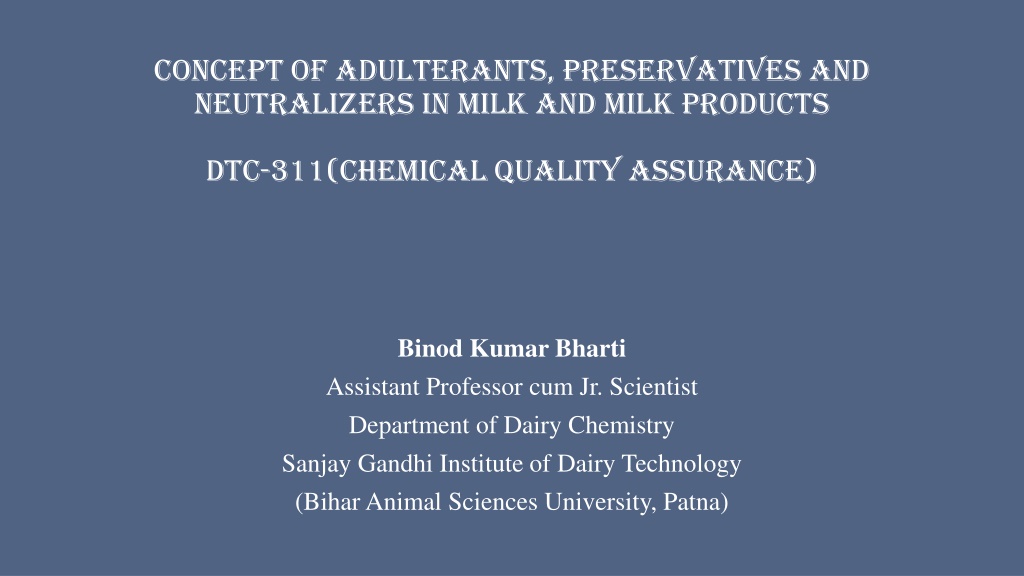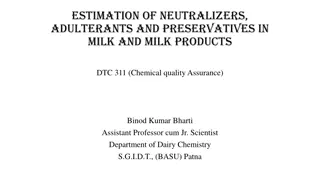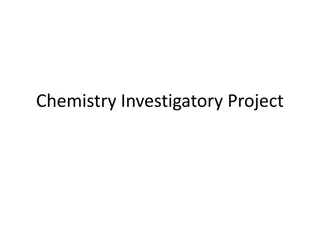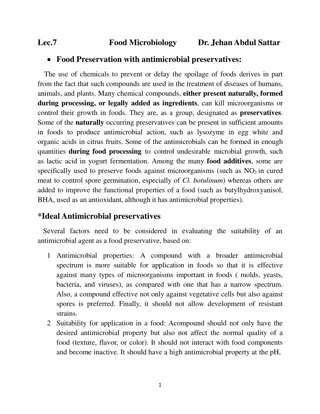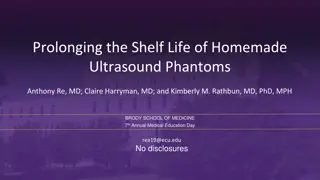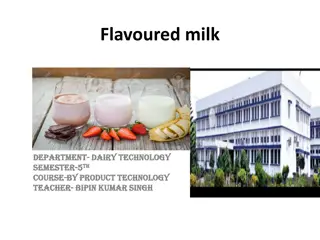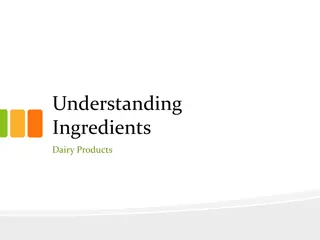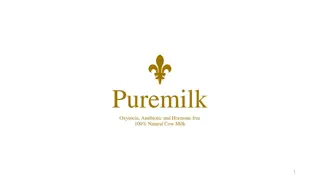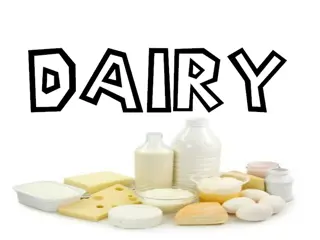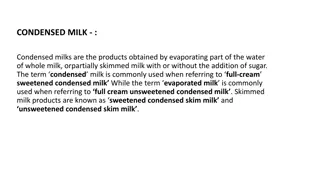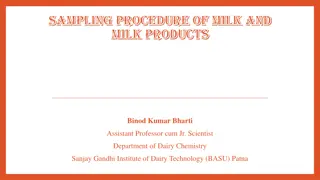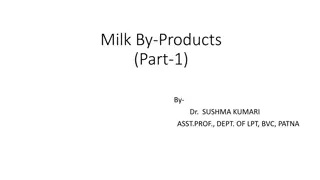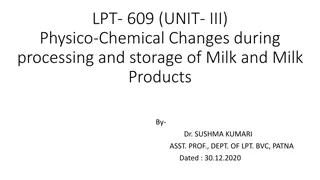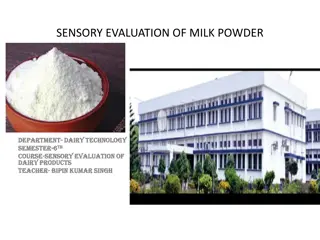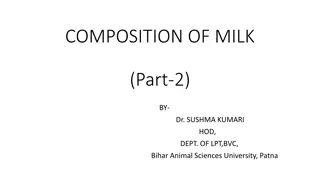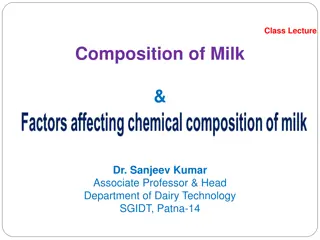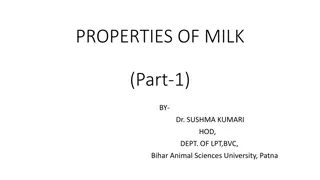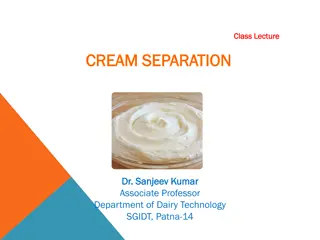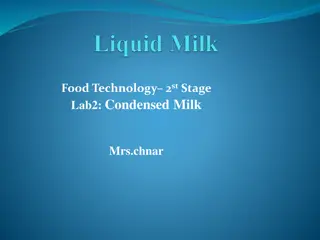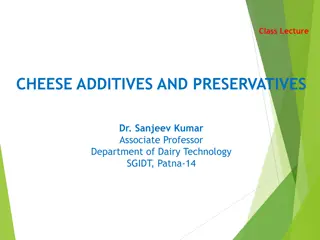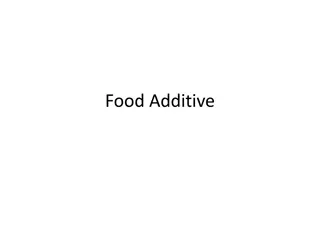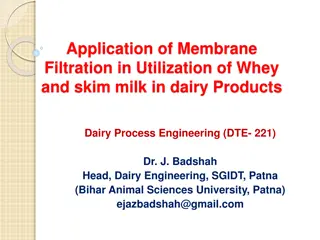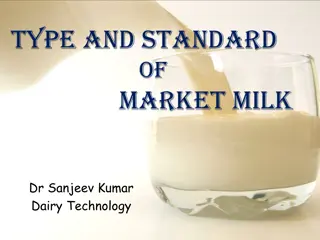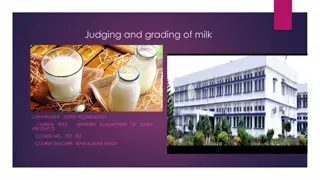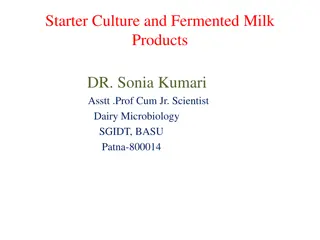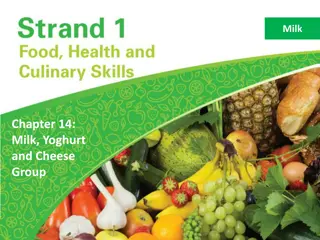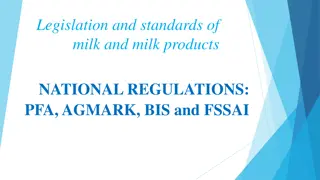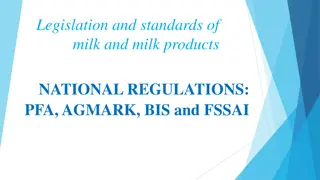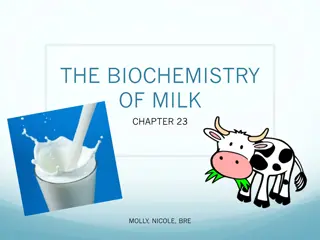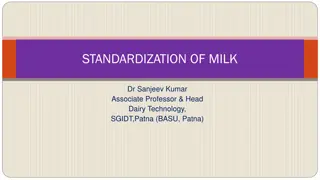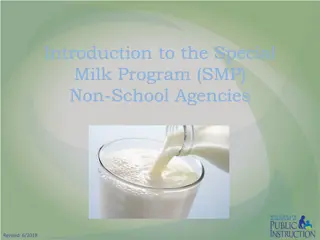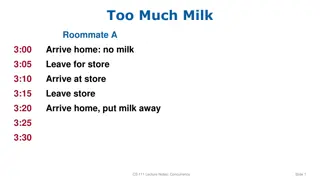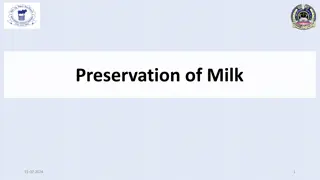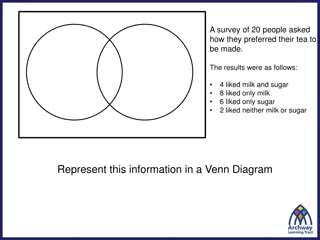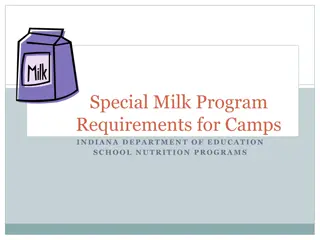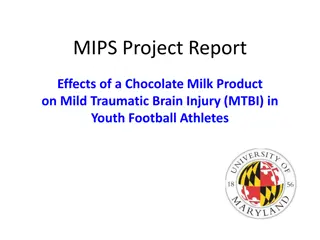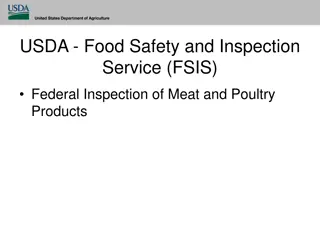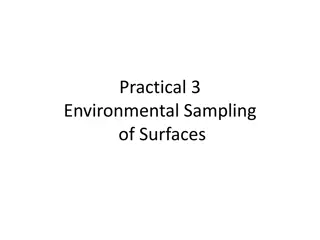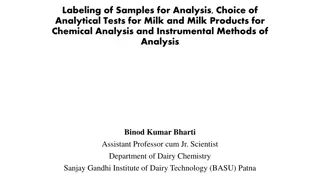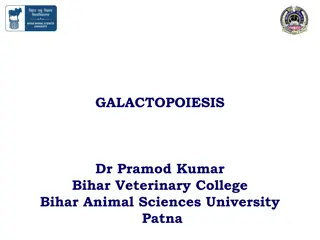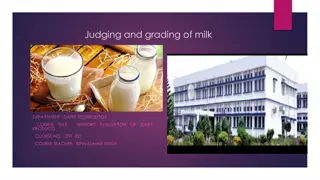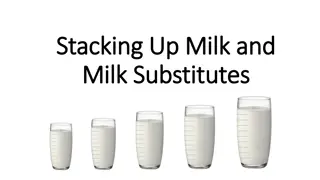Understanding Adulterants, Preservatives, and Neutralizers in Milk and Milk Products
Adulteration in milk involves adding cheaper substances or removing valuable constituents to make extra profit. Common adulterants include carbohydrates, salts, neutralizers, preservatives, detergents, and oils. Preservatives like hydrogen peroxide and formalin are used to prolong shelf life. Neutralizers such as sodium carbonate and calcium hydroxide may be added to maintain pH levels. It's essential to be aware of these practices to ensure the quality and safety of dairy products.
Download Presentation

Please find below an Image/Link to download the presentation.
The content on the website is provided AS IS for your information and personal use only. It may not be sold, licensed, or shared on other websites without obtaining consent from the author. Download presentation by click this link. If you encounter any issues during the download, it is possible that the publisher has removed the file from their server.
E N D
Presentation Transcript
Concept OF ADULTERANTS, PRESERVATIVES AND NEUTRALIZERS IN MILK AND MILK PRODUCTS DTC-311(Chemical Quality Assurance) Binod Kumar Bharti Assistant Professor cum Jr. Scientist Department of Dairy Chemistry Sanjay Gandhi Institute of Dairy Technology (Bihar Animal Sciences University, Patna)
Contents 1. Adulteration 2. List of commonAdulteration 3. Preservatives 4. List of common Preservatives 5. Desirable Properties of Preservatives 6. Neutralizers 7. List of Common Neutralizers
Adulteration of food products Introduction Milk is so highly valuable a food, some malpractice is done by adding cheaper and resembling substance substances to milk or removing valuable constituents from it in order to make an extra profit. This malpractice is called adulteration. Adulteration means the addition of forbidden substances to foods. Definition Addition of cheaper and resembling substance to milk or removal of one or more valuable constituents (like fat) from it keeping that no change is made in properties and composition of milk and in order to make extra profit is called adulteration in milk and the substances added are called adulterants
Adulteration of food products As per the definition of the Prevention of Food Adulteration Act, 1954 (PFA) Rule 2, "adulterant" means any material, which is or could be employed for the purposes of adulteration. Further under rule 44, PFA states that no person shall either by himself or by any agent sell milk which contains any added water and also milk containing a substance not found in milk. Amongst the food items, milk is a complex mixture of nutrients and a liquid food which, can be easily adulterated by the unscrupulous persons. According to PFA definition Milk is the normal mammary secretion derived from complete milking of healthy milch animal without either addition thereto or extraction therefore. It shall be free from colostrum. Milk of different classes and different designations shall confirm to the standards laid down for them.
Adulteration of Milk Common Adulterants The most of the adulterants added to milk can be grouped in the following categories: a) Carbohydrates- Sugar, glucose, starch, malto-dextrin, etc. b) Salts and fertilizers- Urea, ammonium sulphate, ammoniacal fertilizers, potassium sulphate, sodium chloride etc.
c) Neutralizers Sodium carbonate, sodium bicarbonate, sodium hydroxide, calcium hydroxide, etc. d) Preservatives Hydrogen peroxide, formalin etc. e) Detergents Liquid detergents, washing powders etc. f) Oils and Paints Vegetable fats and oils, mineral oil / cutting oil, white paint etc.
Effect of Adulterants on properties and composition on milk Nature of Adulterants Effect on Fat percent Lactometer Reading SNF Percent 1.Addition of water Lower Lower Lower 2. Removal of fat (Cream) Lower Higher Higher 3.Addition of water and starch Lower Normal Normal 4.Addition of Skim milk Lower Higher Normal 5.Addition of cane sugar Lower Higher Higher 6. Addition of Dextrose/Glucose Lower Higher Higher 7.Addition of water and urea Lower Normal Normal
Milk Preservatives Milk is an excellent food for the micro-organism. Milk produced even under the best sanitary conditions contains a considerable number of microorganism. Even pasteurisation does not destroy cent per cent of bacteria present in milk. Bacteria get entry to the milk through the various sources such as a body of the animal, feed of the animal, atmosphere, milker, milking utensils, adulterants and post-pasteurisation contamination etc. Yeast and moulds may also get entry to milk. These micro-organisms bring about certain abnormal changes in the physico-chemical properties of milk when stored. Thus it becomes essential to preserve milk in its original form particularly for analytical purpose.
Milk Preservation Definition Milk preservatives are the chemical substances which, when added to milk in small quantity, either check the growth of micro- organisms present in milk or destroy them and thereby increase the keeping quality of milk The process by which milk is preserved in its original form is called milk preservation. Milk may be preserved by: Physical Preservatives 1. Chilling 2. Heating (Pasteurization and Sterilization) 3. Irradiation methods Chemical Preservatives 1. Adding Chemical Preservatives
For the purpose of Chemical analysis a number of preservatives are used. The choice of a preservatives depends on the purpose of the analysis. Common milk Preservatives- 1. Formalin 2. Mercuric Chloride 3. Hydrogen peroxide 4. BoricAcid 5. BenzoicAcid 6. Salicylic acid 7. Bronopol 8. Potassium dichromate
Desirable properties of a good Preservatives Agood preservatives should possess the following properties: 1. It should be cheap and easily available. 2. It should be non-toxic. 3. It should be easily miscible. 4. It should be colourless, tasteless and odourless. 5. It should not interfere with any constituents of milk or milk products. 6. It should not interfere with physico-chemical properties of milk. 7. It should not cause itching, burn or any other harm to the body. 8. A good preservatives should not create any disorder in the digestive tract if consumed. 9. It should be easily detectable. 10. It should have ability to destroy sufficient number of micro-organism in a very small quantity.
Neutralizers Neutralizers are chemical substances, which are alkaline in nature. They are added to milk in order to regulate the acidity of milk. In milk, sodium hydroxide, sodium carbonate and sodium bicarbonate are added by adulterators to neutralize the developed acidity in milk. Common neutralizers are Sodium hydroxide Sodium carbonates Sodium bicarbonates
